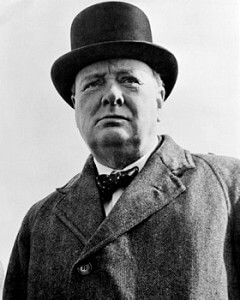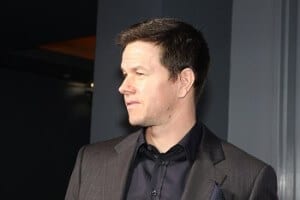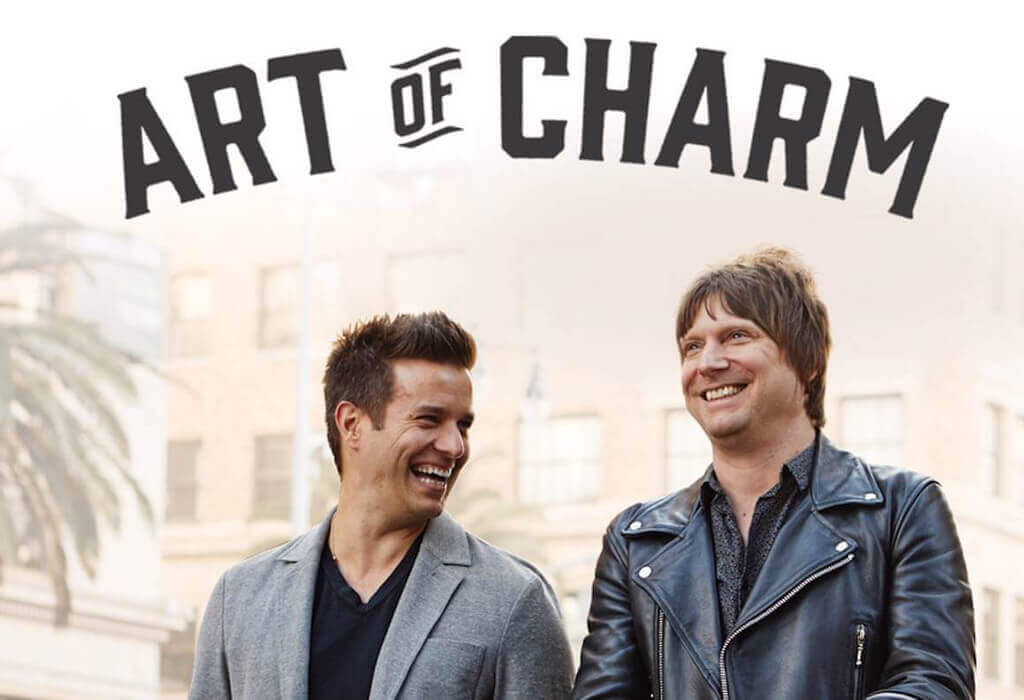I often say that who you are now is not who you have to be. I genuinely believe that our past does not determine our future, and that there’s nothing truly fixed about our personalities. Self reinvention isn’t just possible, but incredibly important for our growth, and there are plenty of effective ways to reinvent yourself.
So I got to thinking: Who are some men who have remade themselves successfully? What can we learn about personal development from prominent figures who transformed over time?
Everyone talks about personal development, but I was particularly interested in examples of radical transformation — deep, massive, life-changing shifts. In particular, I wanted to know about men who reinvented themselves multiple times over their lives. And I wasn’t interested in looking to them for inspiration, but as manuals for change. I wanted to know how they were able to transform from one kind of man to another, and to discover, as best I could, what their stories might teach us.
Winston Churchill
“Success is not final, failure is not fatal: it is the courage to continue that counts.”
 Winston Churchill was the first British Prime Minister to win the Nobel Prize in Literature and the first honorary citizen of the United States. He often comes in near the top of “Great Men of the 20th Century” lists, or even “Great Men of All Time.” But he wasn’t always held in high esteem. Churchill actually spent most of the 1930s reviled by the British public, as well as his own party. His comebacks are examples of how men can reinvent themselves after major setbacks.
Winston Churchill was the first British Prime Minister to win the Nobel Prize in Literature and the first honorary citizen of the United States. He often comes in near the top of “Great Men of the 20th Century” lists, or even “Great Men of All Time.” But he wasn’t always held in high esteem. Churchill actually spent most of the 1930s reviled by the British public, as well as his own party. His comebacks are examples of how men can reinvent themselves after major setbacks.
Before the First World War, Churchill was a young rising star in the Conservative Party. At the age of 36 he was appointed First Lord of the Admiralty, basically the UK’s Secretary of the Navy. He held this post for four years until the notoriously disastrous Gallipoli landing. Since he was largely held responsible, his demotion was a condition of coalition between his party and others in Parliament — a major blow. Churchill, with impressive resolve, decided that his best option was not a small readjustment after Gallipoli, but a radical change.
So Churchill joined the military. This itself wasn’t unusual, even for a man of the upper classes. What was unusual was Churchill’s exceptional bravery and leadership. He personally made no fewer than 36 runs into no man’s land. His section saw some of the fiercest frontline action in his division. He threw himself into battle with the same vigor he would the Prime Minister’s office, which he wouldn’t hold for another 24 years.
There’s a killer blueprint here for anyone with a job they’re not stoked about: work hard, even after a setback, and even in less-than-ideal situations, and find yourself developing a track record and a skill set you never thought you’d develop. A reputation can develop even in terrible circumstances — whether it’s a bad job or a full-on war — and often because of them. And for those with their eye on a promotion: Push yourself to perform at the level you want, not at the level you are. When it comes to self-transformation, in the doing is the becoming.
Churchill, of course, was tenacious. Rather than brood about his poor hand, for example, he used the opportunity to simply become more like the man he wanted to be. As a member of the British aristocracy, Churchill could have easily chilled in a command tent smoking cigars and drinking martinis all day (these perks were not uncommon). Instead, he worked his ass off, serving both in front-line military positions and speaking regularly in Parliament, earning the respect of his countrymen and, as a result, resuscitating his political career. This is personal development on a higher level.
Most of us won’t go to war. But we don’t have to. Our “wars” are all around us, and there are other ways to reinvent yourself: You can invest extra hours at work, taking on the things no one else will; or hit the gym, a little harder than you have before; or pick up a book and teach yourself something new for an hour each night. Like Churchill, you’ll feel the resistance. But directing your negative energy into something productive, something larger than yourself, is one of the smartest paths to growth.
Churchill’s country eventually rewarded him by making him Minister of Munitions, no small post for a country at war — and no small achievement for a man synonymous with defeat. He went on to become Secretary of State for War and Secretary of State for Air, then Chancellor of the Exchequer, arguably the second most important political position in Britain. You might not be the second most powerful man in America for your efforts, but you will watch your own successes pile up: promotions, opportunities, friendships. Each is a milestone, big or small, on your journey.
And like all journeys, there are moments of confusion and self-doubt. The 1930s are called Churchill’s “wilderness” period, something we’ve all had at least once — a time when things are just not going your way, when you just can’t catch a break, when your goals and passions seem vague, impossible, maybe even obsolete. Though he fell out of political favor during this time — again — Churchill found ways to maintain his profile and influence in public.
He became president of the New Commonwealth Society, a pro-British peace organization. He worked on biographies and histories, establishing himself as a man of letters. These were not roles or projects he was especially familiar with, but he dove right in. Another helpful reminder that just because one path is closed doesn’t mean you can’t find another — often in ideas, places and opportunities you’ve never contemplated before. That’s great wisdom for anyone stuck in a rut at work, or feeling unappreciated or unmotivated in life.
Meanwhile, conflict was brewing. Churchill began advocating for rearmament and preparation for an inevitable second war with Germany. His position was straight-up toxic during the interwar period, when the appeasement policies of Neville Chamberlain held sway. When war broke out, Churchill was made First Lord of the Admiralty for a second time, and after Chamberlain’s resignation, he became the clear choice for Prime Minister. In reality, he had been becoming the right choice for years.
The lesson for us? It can be tempting to go with the flow, to back popular ideas, to avoid the scrutiny that comes with unpopular opinions, than it is to stick up for what you really believe. But once you do, the playful wandering of your own self-development has a way of snapping into focus. Churchill’s wilderness period reminds us that “not all who wander are lost,” so long as we are striving to be great each step of the way, and willing to stick to our convictions when necessary.
 Mark Wahlberg
Mark Wahlberg
“I have a lot of real-life experience with hustling and doping and doing stupid stuff.”
Academy Award-nominated actor Mark Wahlberg wasn’t exactly a role model as a child.
He was in trouble with Boston police 25 times and addicted to cocaine by the age of 13. Two civil suits were filed against him at the age of 15 for making racist remarks and throwing rocks at black schoolchildren on field trips. At 16, he was convicted of a hate crime against a Vietnamese man. Prison is not a friendly place for a teenager, and Wahlberg was sent to the worst in the state. This is where he began turning his life around, and accidentally created a model for how all men can change their lives in even the most dire circumstances.
While in prison, Wahlberg came under the guidance of his parish priest. Once he got out, he left his street gang, which was not easy to do. In fact, Wahlberg spent a lot of time fighting them off to maintain his independence. It’s hard to overstate just how difficult and scary that probably was for him, so let’s extrapolate the courage and focus it must have required to our own lives.
We all want to make radical changes, but we often fear the consequences. We give in to the structures we’re familiar with. Consciously or unconsciously, we run with the group we’re most familiar with. Even if you recognize the long-term benefits are changing, you might avoid a confrontation out of fear of the shorter-term consequences. Wahlberg’s case is extreme, but it underscores the importance of embracing what you feel is right, and making hard short-term choices that have great long-term benefits.
But it didn’t get easier. Wahlberg spent years struggling to find his legs after prison. He tried music with New Kids on the Block, which wasn’t a fit. Marky Mark and the Funky Bunch scored some hits, but Wahlberg became better known for pulling his pants down on stage than for his musical prowess. He wasn’t particularly interested in acting, but he auditioned for a role on a whim.
That was a prescient move. He landed the role, which would eventually launch his career in Renaissance Man, and set up a long and successful career as the actor we know today. Here’s a lesson we can easily map to our own lives: the hidden magic in trying something new, something we’re not comfortable with. Even when it’s small. Even when it feels foreign or silly or strange. Especially then.
When we’re stuck in a rut and can’t see a way out, it’s often because we haven’t really accepted the changes we’ll need to make to get us to our goal. Wahlberg shows us what it means to confront those changes head-on: Making the hard decision to leave a street gang, despite his personal safety; leaving a music group poised for success, dropping his musical career entirely when it hit a dead end; learning new skills to be taken seriously as an actor, even if he didn’t know it would work.
None of these decisions were comfortable, but they had to be made.
We still see that principle at work in him today. Wahlberg is notorious for breaking out of his comfort zone, as he did with The Fighter. He refused to use a stunt double on the film, trained like a heavyweight prizefighter, and took every punch you see on camera. When he starred in The Shooter, Wahlberg learned to shoot targets 1,100 feet away in two days. Wahlberg could have easily phoned it in, used a stunt double and sit in his trailer. But he doesn’t. He becomes the guy he’s portraying on screen.
And so can we. We can become the man we want to be in the future, by starting to act like him today. Look for areas in your life where you’re phoning it in — we all do here and there — and explore what it would be like, if only as an exercise, to really, truly engage with them. What kind of employee would you be? What kind of friend? What kind of partner? Then, confronting what it takes to reach the next level, embrace the changes that have to be made.
Looking for the quickest ways to reinvent yourself? A good exercise is to regularly do things that scare the hell out of you. Give a toast. Develop a product. Talk to a new person. Confront the intimidating unknowns that Wahlberg made a theme of his life.
David Bowie
 “The truth is, of course, is that there is no journey. We are arriving and departing all at the same time.”
“The truth is, of course, is that there is no journey. We are arriving and departing all at the same time.”
David Bowie is a totem of reinvention. Few people have their public perception so closely tied to personal transformation. Any survey of remade men would be incomplete without him.
Bowie’s first success came when “Space Oddity” became a hit in 1969. “Ziggy Stardust” then took Bowie from a novelty single success to unbelievable popularity. But he had trouble separating his true self from his stage persona, and the excesses that came with it. Even in the midst of a budding drug addiction, Bowie was able to see how his mental well being was infinitely more important than commercial or critical success. Sometimes, in a chase for accolades, money or status, it can be easy to forget that mental health counts so much more. Indeed, the rewards mean nothing without it.
So Bowie uprooted himself and moved halfway around the world to Berlin. His “Berlin period” represented an even stronger departure from past work. Sparse and spare, the records from this era owe more to funk, soul and Brian Eno’s signature keyboard work than the hard rock or psychedelic of his earlier period. Bowie wasn’t necessarily innovating, but he was taking chances — chances that paid off. How terrifying! How uncomfortable. It’s a feeling we can relate to, right? To be able to dive into a new way of behaving, of thinking, of reacting to the world, and to trust that the results will at least be instructive, maybe even good, maybe even great. That’s what Bowie teaches us here.
His biggest commercial triumph, “Let’s Dance,” followed in 1983. The album was not only Bowie’s greatest commercial success thus far, but also spawned a six-month tour and introduced the world to Stevie Ray Vaughan. Still, the success was shallow. After “Let’s Dance,” Bowie was almost universally derided as passé, a bad joke and a trend chaser. His popularity has shifted polarities.
So in 1989, he decided it was time for a step in a radically new direction.
Rather than continuing his insanely lucrative solo career, Bowie made an almost unprecedented step for an established artist of his caliber: He formed a band. Tin Machine was a major departure from Bowie’s recent pop period. Bowie began echoing the sounds of late 80s alternative rock, a new approach. In order to test himself and to become culturally relevant again, he scrapped the persona and the style that came before and sought to develop new ones. It was drastic, potentially career-ending, and — many would say — totally unnecessary. But Bowie was becoming something new. Again.
That period lasted a couple years, until he relaunched his solo career, this time fixated on the sounds of jungle and industrial music. Though Bowie didn’t invent these sounds, he indulged his ear for what was hot. And there’s a lesson here for us, too — one that is simple but profound. You don’t have to reinvent the wheel to be successful. You don’t need to discover new worlds. You can just do things that other people are doing better. You can make them your own. That is its own form of genius.
So tell us: Which men do you admire? How did they reinvent themselves over time? How did they go about making those changes? What lessons have you learned from them, in terms of ways to reinvent yourself? Share your thoughts with us here, and let’s start studying the stories of other extraordinary people.



